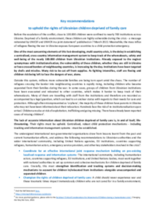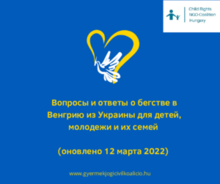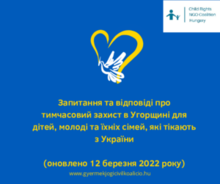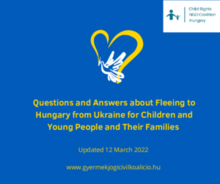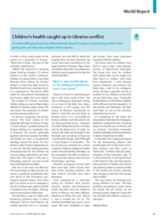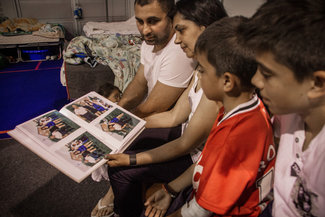

Displaying 351 - 360 of 1079
Ukraine's Ministry of Social Policy has said interstate adoption is impossible under the current conditions, and the dissemination of such false information contains signs of fraud and a violation of children's rights.
These recommendations are intended for international, national and local agencies and authorities with a role to play in the emergency response in Ukraine, in particular in aspects pertaining to protection of children. All NGOs called on the international community to protect the 100,000 children from institutions in Ukraine. These organizations warned that without a centralised system to track the whereabouts, safety and well-being of these children, they risk being trafficked, or abandoned.
Some surrogate mothers are trapped by the fighting as their due dates near. And newborns face uncertain fates, with many biological parents now unable to travel to Ukraine.
Это руководство предназначено для молодых людей и их семей, спасающихся бегством от конфликта в Украине в Венгрию. Он содержит основные практические вопросы и ответы, чтобы помочь тем, кто нуждается в немедленной помощи по прибытии в Венгрию. Этот ресурс был составлен Гражданской коалицией за права ребенка, крупнейшей в Венгрии профессиональной сетью гражданского общества по правам ребенка.
Цей посібник розроблено для молодих людей та їхніх сімей, які тікають від конфлікту в Україні до Угорщини. Він містить основні практичні запитання та відповіді, щоб допомогти тим, хто потребує негайної допомоги після прибуття в Угорщину. Цей ресурс був складений Громадянською коаліцією за права дитини, найбільшою професійною мережею громадянського суспільства в Угорщині з прав дитини.
Ez az útmutató azoknak a fiataloknak és családtagjaiknak készült, akik az ukrajnai konfliktus elől Magyarországra menekülnek. Alapvető gyakorlati kérdésekkel és válaszokkal segíti azokat, akiknek Magyarországra érkezéskor azonnali segítségre van szükségük. Ezt a forrásanyagot a Civil Koalíció a Gyermekjogiért Magyarország legnagyobb gyermekjogi szakmai hálózata, a Civil Koalíció a Gyermekjogiért állította össze.
This guide is designed for young people and their families fleeing the conflict in Ukraine to Hungary. It provides basic practical questions and answers to help those who need immediate assistance upon arrival in Hungary. This resource was compiled by the Civil Coalition for the Rights of the Child, Hungary's largest civil society professional network on the rights of the child.
In this Lancet article, the author Saleyha Ahsan highlights the growing threat faced by Ukraine's 7·5 million children as the conflict continues. Children are being killed or wounded through direct attacks by Russian military or they have been forced to flee their homes to an uncertain future. In a statement to The Lancet, WHO called for international humanitarian and human rights law to be upheld. “The number of civilians, including children, dying as a result of the military offensive in Ukraine keeps rising. This must stop. The protection of civilians must be priority number one.”
This report is produced by OCHA Ukraine in collaboration with humanitarian partners.
It covers the period from 3 p.m. (EET) 10 March to 3 p.m. (EET) 11 March.
Traffickers are targeting parentless children on the Ukraine-Poland border, says a group evacuating orphanages in the war zone.

